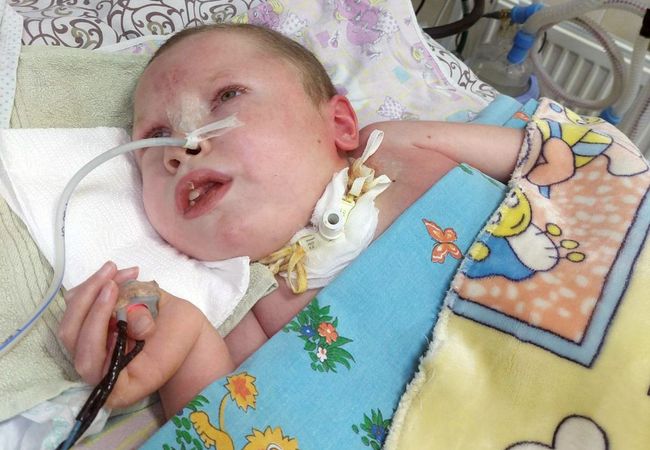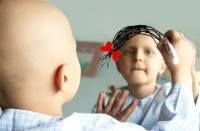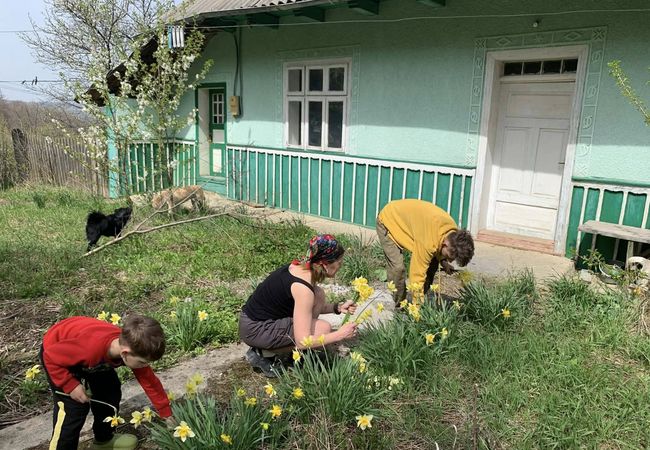
Kristie Graves with Bridget in a hotel in western Ukraine.
They are sitting in the Pink Flamingo, a diner with red upholstered seats and walls plastered with photos of cars from the 1950s. A married couple from Maryland is sitting across from a six-year-old girl and a woman with red hair. The girl and the woman are from Zaporizhzhia, some 450 kilometers east of Kyiv.
The man from Maryland is trying to teach the girl a bit of English. He picks up the saltshaker and says: "Salt. Salt." The girl grabs for the shaker and says in Russian: "Give it to me."
The man grabs the bottle of ketchup. Ketchup is called ketchup everywhere. The girl says: "Ketchup."
The man says: "Yeah, bud."
The woman with the red hair giggles discretely. "Yeah bud" sounds like the Russian word for "fuck".
A family that is happy in its own way. The married couple, Kristie and Philip Graves, are from the small town of Brunswick, she a respiratory therapist and he a pastor. They have adopted the girl from Zaporizhzhia – and had to travel through the heart of wartime Ukraine to do so.
Now, here they are sitting in this diner in Warsaw, the girl poking around in her Caesar salad. It’s hard to get more American than this – at least not in Poland. They have an appointment with the U.S. Embassy in the city to acquire the appropriate travel documents for their daughter.
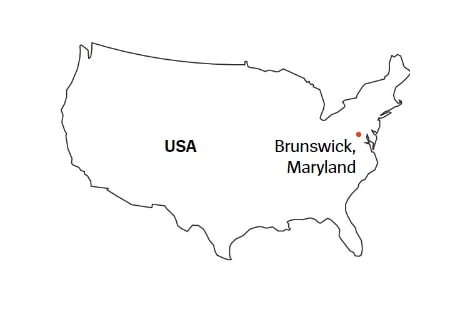
The woman with red hair, Marina Boyko, took care of the child back in Ukraine. She was essentially the girl’s replacement mother all these years.
The girl’s name is Bridget, the same girl whose name circled the globe a few years ago. She was carried by a surrogate mother in Ukraine, before being born prematurely in the 25th week of pregnancy. Her American parents rejected her and she has lived in an orphanage ever since.
Bridget has clubfeet and still can’t walk, even though she is six years old. She has a hard time speaking and doesn’t see well.
She has survived the war.
Her journey to Poland marks the end of a drama that DER SPIEGEL reported on in early April . For several months, it wasn’t clear if the American couple would be able to adopt the stateless child in the middle of the war. Whether and when the girl could be evacuated from Zaporizhzhia was just as uncertain. And what about Bridget’s long-time caregiver, the nurse Marina Boyko?
A lot has happened since then.
Just a few days after the initial article was published by DER SPIEGEL, the youth welfare office in Zaporizhzhia granted permission to the children’s home to evacuate all children with disabilities to western Ukraine. Children from the home who didn’t need special attention during travel had already been evacuated early in the conflict.
A special train arranged by Doctors Without Borders took Bridget and dozens of other children to the west. On April 12, they were put up in a former hospital near Lviv.
Bridget’s new parents, Kristie and Philip Graves, were still not yet permitted to pick her up. The adoption process was largely complete, but they needed one final signature from a judge in Zaporizhzhia.
The judge communicated to the couple that they had to come all the way to Zaporizhzhia to obtain his signature. Both of them. He was familiar with their file, he assured them, but he wanted to meet them in person. The Graves asked if they could perhaps meet over Zoom instead. The Russian military, after all, had just started a new offensive in eastern Ukraine and Zaporizhzhia was under fire as well.

Philip and Kristie Graves taking a break on the road to Kyiv.
The judge said "no."
On April 27, Kristie and Philip Graves landed at the airport in Warsaw. They brought along a pink suitcase for Bridget’s stuff and a black one for the Ukrainian employee of the adoption agency who had joined the Territorial Defense Forces. Inside was a bullet proof vest and an empty AK-47 clip.
I picked up the couple at Chopin Airport in Warsaw. After the publication of the initial piece in DER SPIEGEL, I had become a part of the story. I spoke on the phone with the nurse in Zaporizhzhia, with employees of the adoption agency in Kyiv and with the parents in Maryland – and together, we prepared Bridget’s trip from Ukraine to the U.S. When reporting such stories, it isn’t always easy to maintain the appropriate journalistic remove.
I drove the couple to the border in a rental car. Kristie and Philip Graves had never been to Europe before. They are the parents of three biological children and a daughter they adopted from Armenia who is confined to a wheelchair. Both of them fell asleep in the car, with Philip only waking up from his jetlag when I almost hit a deer. Kristie, though, just kept sleeping. He told her later about the deer, as if wanting to tell her something reassuring.

Kristie had recently almost hit a deer back in the U.S. In Europe, too, deer frequently jump in front of cars. It was like a small element of normalcy.
When they got out of the rental car at the Hrebenne checkpoint, Philip Graves said: "I still can’t believe we’re doing this."
I wasn’t allowed to take them any further. I have a Russian passport and had to remain in Poland. On the other side on the border, at the Ukrainian checkpoint Rava-Ruska, they were to be met by Alex, a Ukrainian employee of the adoption agency. He isn’t allowed to leave Ukraine, being a man of military age.
The two checkpoints are separated by just a few hundred meters, but walking from one to the other isn’t allowed. So, for this short stretch, I started looking around for a ride for the American couple. They were standing on the edge of the road as though they had been painted into the landscape by some crazy artist: khaki shorts, travel pillows and the exhausted smiles of desperate hitchhikers. The few cars with Ukrainian license plates ignored us.

An injured person being brought in to the military hospital in Zaporizhzhia.
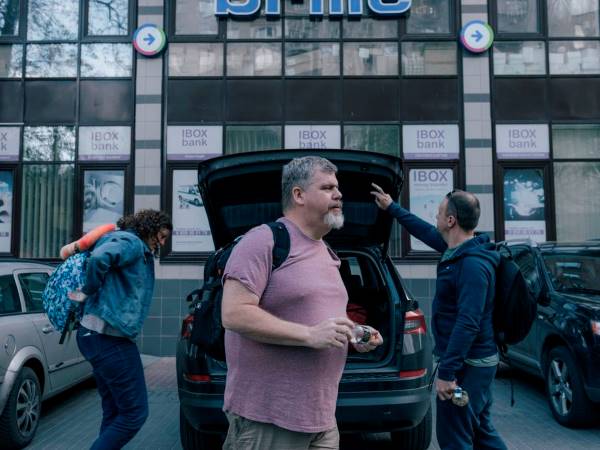
In Kyiv with Alex, an employee of the adoption agency.
A truckdriver named Nikolai, though, agreed to ferry them across the border. In his early 60s, Nikolai is from the Ukrainian city of Sumy and he was coming from Warsaw with a load of body armor. He lit a cigarette and then said: "Putin is a jerkoff." He then said: "Zelenskyy is a jerkoff." And then: "Biden is a jerkoff."
"Politicians who can’t prevent a war shouldn’t be allowed to be in politics," he continued.
Nikolai’s truck hardly made any progress in the line of vehicles. Finally, after an hour and a half, a Polish border guard took pity on Kristie and Philip, stopping a minibus for them with a sticker reading: "Humanitarian Aid."
When they had said goodbye to their children in Maryland two days earlier, their eight-year-old adoptive daughter had given them a thumb-sized, plastic helicopter pilot to take along as a good luck charm. Philip Graves loves pickles, and he named the plastic pilot Mr. Pickles – and promised his daughter that he would send back photos of Mr. Pickles from the trip.
Over the next several days, he took a lot of pictures, but not very many of them included Mr. Pickles. On the drive to Kyiv, they passed burned-out Russian tanks. They were in Kyiv on the same day that UN Secretary-General Antonio Guterres was visiting Ukrainian President Volodymyr Zelenskyy, the day that the Russians fired missiles at a residential building, killing a journalist. The Graves were around 300 meters away when the missiles struck.
They hardly slept at all on the night train to Zaporizhzhia, and once they arrived, they checked into a hotel whose main entrance was barricaded with sandbags. At the courthouse, they had to wait for an hour and a half before the hearing began. One of the jurors had failed to show up because of the air raid alarm that morning and the judge was looking for a replacement. As they waited, Philip Graves placed Mr. Pickles, his legs spread wide, on the brown court table and took a picture of him with the Ukrainian coat of arms in the background.

Heading off to Zaporizhzhia: Kristie and Philip Graves at the train station in Kyiv.
The court proceedings, for which they had traveled 62 hours, were over in less than half an hour. The judge asked them through an interpreter if they were really able to afford a fifth child and how they planned to provide the prematurely born child the medical care she would need throughout her life. Then, the judge handed over the adoption certificate.
"It’s a girl!" Philip Graves wrote to me from the courtroom.
On their return trip to Poland, they brought along Marina Boyko, the nurse who had spent years caring for Bridget. Boyko was unable to adopt Bridget herself in Zaporizhzhia since she doesn’t earn enough. But she would visit Bridget regularly in the children’s home and take her to western Ukraine for therapy sessions. Last year, Boyko contacted an American adoption agency on Facebook, which is how the Graves found Bridget.
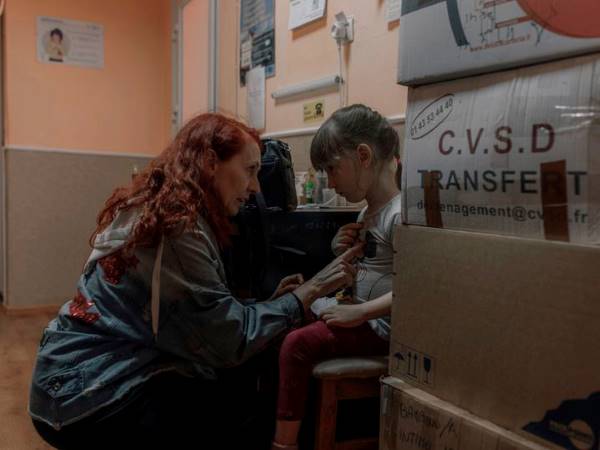
Marina Boyko with Bridget in the provisional children's home near Lviv
Soon, Philip and Kristie Graves will be flying back to the U.S. with their daughter. Bridget is still stateless, but with the travel document issued by the U.S. Embassy in Warsaw, she will become an American citizen as soon as the plane has touched down in the U.S.
The Graves family and Marina Boyko are staying in the same three-star hotel near the airport in Warsaw. As soon has Bridget has left, Boyko will be returning by bus to Zaporizhzhia, where she works in the children’s hospital. It is the same hospital where Bridget was cared for following her premature birth. Boyko’s mother also lives in Zaporizhzhia.
In Warsaw, the nurse explains to Bridget’s new parents why the girl grows restive after a short walk. At the home where she lived, the children only went out for 15 minutes a day. She tells them why the first thing Bridget does when entering a room is look around for the television. At the home, the children would sit in front of the television for several hours each day. She doesn’t have to tell the Graves why Bridget wants to sample every dish on the table at restaurants.
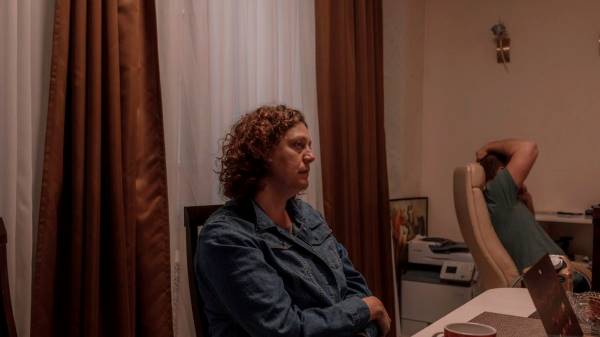
Bridget doesn’t yet understand English. She speaks to her new parents in Russian, asking Kristie who Philip is and asking Philip why he has a beard. And she keeps asking Marina the same question over and over again: "When are we going home?"
The Graves and Marina Boyko communicate via Google Translate. None of them are sure what exactly Bridget means when she says "going home" or "we."
Philip and Kristie want Marina to visit them in the U.S. as soon as possible. But Marina says it would perhaps be better if Bridget would forget Russian as soon as possible, forget Zaporizhzhia and also forget her, Marina.
She sits on a bench in front of the hotel entrance smoking a cigarette, and startles when a plane takes off from the nearby airport. The only connection she has to planes is war. Back in the room, Kristie is changing Bridget’s diaper. Phil Graves comes down to say goodnight to Marina, who starts crying. He sits down and gives her a hug before then typing into Google Translate on his phone: "You will be the one who picks out her wedding dress."

